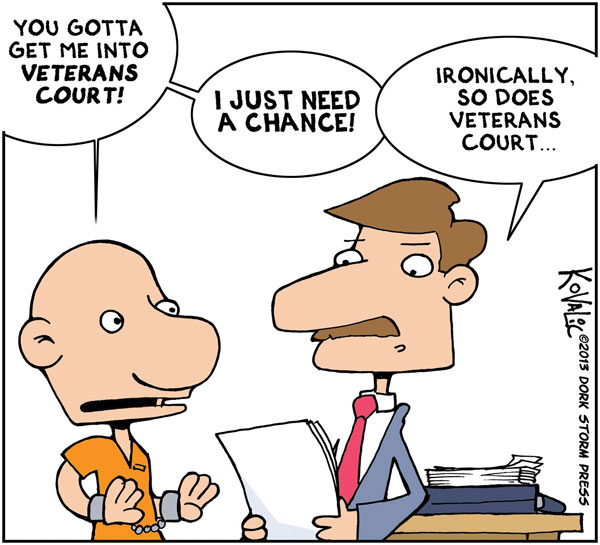Editorial: Veterans courts built to last
By: WISCONSIN LAW JOURNAL STAFF//January 21, 2013//
This month’s Wisconsin Law Journal print edition’s cover story about veterans courts has lots of information, but glaringly lacks the answer to the most important question: Are veterans courts successful?
The treatment courts provide greater support for defendants, offering mentorship, access to job training, and treatment for substance abuse and mental health disorders as part of handling veterans charged with certain criminal offenses. Eleven veterans courts have opened in Wisconsin since 2009.
The oldest program in the state, Rock County Veterans Treatment Court, started three years ago. Fifteen veteran-defendants have completed the program there, Rock County Circuit Judge James Daley said, and as far as he knows, none has re-offended.
But there is no evaluation system to measure the long-term success of those who participate, Daley said.
The same is true of the Northeast Wisconsin Veterans Treatment Court in Brown County. Circuit Judge Kendall Kelley, who oversees that program, said the court is developing a tracking system.
Finding a way to track each court’s success is important, Kelley acknowledged, because that is the way to improve the process.
Success rates and data also will be necessary to prove the courts are worth the time and effort they require.
For now, veterans courts are not costing local or state governments any extra money, Kelley and Daley said, because the U.S. Department of Veterans Affairs covers treatment, and court employees are paid regardless of what court they’re in on a particular day.
But there is a significant time commitment for everyone involved. Judges, such as Kelley, set aside specific times each week to handle veterans court. Mentors, such as those involved with the northeast Wisconsin program, volunteer their time to guide veteran-defendants both inside and outside the courtroom.
Those involved with the veterans courts explain they have both a sense of duty to the men and women who served our country, and a desire to reduce recidivism.
Such motivation has held firm for these initial three years. But unless data show measurable success, even the best intentions could erode.
To make certain that veterans in trouble get meaningful help, the people of Wisconsin should demand a systematic, reliable tracking method that proves the courts’ long-term success and ensures treatment programs are more than just a fad.
As of now, the advocates of veterans courts have left until last the answer to the first question they should be asking.
Legal News
- History made in Trump New York trial opening statements
- Prosecutor won’t bring charges against Wisconsin lawmaker over fundraising scheme
- Republican Wisconsin Senate candidate says he doesn’t oppose elderly people voting
- Vice President Harris to reveal final rules mandating minimum standards for nursing home staffing
- Election workers fear threats to their safety as November nears
- Former law enforcement praise state’s response brief in Steven Avery case
- Eric Toney announces re-election bid for Fond du Lac County District Attorney
- Former Wisconsin Democratic Rep. Peter Barca announces new bid for Congress
- Republicans file lawsuit challenging Evers’s partial vetoes to literacy bill
- More human remains believed those of missing woman wash up on Milwaukee Co. beach
- Vice President Harris returning to Wisconsin for third visit this year
- Wisconsin joins Feds, dozens of states to hold airlines accountable for bad behavior
WLJ People
- Power 30 Personal Injury Attorneys – Russell Nicolet
- Power 30 Personal Injury Attorneys – Benjamin Nicolet
- Power 30 Personal Injury Attorneys – Dustin T. Woehl
- Power 30 Personal Injury Attorneys – Katherine Metzger
- Power 30 Personal Injury Attorneys – Joseph Ryan
- Power 30 Personal Injury Attorneys – James M. Ryan
- Power 30 Personal Injury Attorneys – Dana Wachs
- Power 30 Personal Injury Attorneys – Mark L. Thomsen
- Power 30 Personal Injury Attorneys – Matthew Lein
- Power 30 Personal Injury Attorneys – Jeffrey A. Pitman
- Power 30 Personal Injury Attorneys – William Pemberton
- Power 30 Personal Injury Attorneys – Howard S. Sicula









